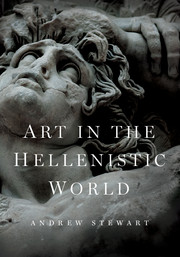Book contents
- Frontmatter
- Contents
- List of Illustrations
- Preface
- Introduction
- 1 Settlement
- 2 Power
- 3 Victory
- 4 Benefaction
- Focus I The Great Altar of Pergamon
- Focus II Hellenistic Mosaics
- 9 Luxury
- 10 Difference
- 11 Death
- 12 Reception
- Appendix A The Artist
- Appendix B Kallixeinos of Rhodes on the Wonders of Alexandria
- Glossary
- Timeline
- Biographical Sketches
- Select Bibliography and Further Reading
- References
- Sources of Illustrations
- Index
9 - Luxury
Published online by Cambridge University Press: 05 October 2014
- Frontmatter
- Contents
- List of Illustrations
- Preface
- Introduction
- 1 Settlement
- 2 Power
- 3 Victory
- 4 Benefaction
- Focus I The Great Altar of Pergamon
- Focus II Hellenistic Mosaics
- 9 Luxury
- 10 Difference
- 11 Death
- 12 Reception
- Appendix A The Artist
- Appendix B Kallixeinos of Rhodes on the Wonders of Alexandria
- Glossary
- Timeline
- Biographical Sketches
- Select Bibliography and Further Reading
- References
- Sources of Illustrations
- Index
Summary
As will be evident by now, the Hellenistic world – or at least much of it – was enormously rich, for Alexander’s conquests had flooded it with treasure. The Persian capitals of Susa, Persepolis, and Pasargadae alone had yielded more than 150,000 talents (about 4,000 tons) of gold and silver bullion, not to mention a fortune in coin and precious metal vessels. Much of this soon went into circulation in the form of gifts and benefactions, military pay, and outlays for construction projects. (Building all those Alexandrias cost money.) It was this vast haul, augmented by loot from the king’s subsequent campaigns, those of his successors, and massive exactions from the conquered, that fueled the Hellenistic world for two centuries and, from 200, also began to flow westward to Rome.
Schooled by Aristotle that self-regulation is a cardinal virtue and liberality a technology of power, Alexander himself was personally quite austere but could be overwhelmingly generous when the occasion merited it. As Chapter 4 showed, such generosity creates and cements friendships, generates obligations, reinforces one’s status, and hugely impresses others. (Thus, when asked by an impecunious friend for dowries for his daughters, Alexander gave him fifty talents; advised that ten would be enough, the king replied, “Enough for you to accept, but not enough for me to give.”) Yet several of his successors – and their followers – were much less self-controlled.
- Type
- Chapter
- Information
- Art in the Hellenistic WorldAn Introduction, pp. 206 - 226Publisher: Cambridge University PressPrint publication year: 2014



